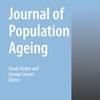Publications
The Changing Capabilities of Cohorts of the Elderly in Russia during 1990–2020: Measurement using a Quantitative Index
Category: Journal Articles
People:

Davis, C. M. (2017) The Changing Capabilities of Cohorts of the Elderly in Russia during 1990–2020: Measurement using a Quantitative Index. Journal of Population Ageing, 1-56. https://doi.org/10.1007/s12062-017-9179-1
Russia has had a high elderly share of its population like the OECD countries, but has had a more turbulent history over the past 100 years, which has caused fluctuations in the capabilities of those turning 60 (measured by education and training, income, enabling environment, medical care, and health status). This article analyses the life experiences and capabilities of five Russian birth cohorts turning 60 over the period 1990–2020. It presents relevant concepts, reviews past research, and evaluates the importance of health factors (health environment, health-related behaviours, medical care, health status) in determining the activities and contributions of older people in Russia. A Human Capabilities of the Elderly in Russia Index (HCERI) with 22 indicators is developed. Russian data are used in the calculation of the HCERI for the cohorts turning 60 in 1990, 1995, 2000, 2010 and 2020. The article then presents evaluations of the experiences and changes in capabilities for each of the five selected cohorts of the elderly in four periods of life: Childhood (1–15 years), Young Adult (16–49), Mature Adult (50–59), and Early Elderly (60–69). The implications of changes in the characteristics of the elderly for Russian government policies are discussed.
- Population Horizons - Special Issues & Working Papers
- Population Horizons Archive (2015-2018)
- Blog
- IARU Newsletter
- Journal of Population Ageing
- Population Horizons Publications
- Books
- Book Chapters
- Journal Articles
- Research Reports & Policy Briefs
- Institute Working Papers
- Papers by members of the Institute's Regional Networks
- Visitors Papers
- Global Ageing Survey Research Reports
- Ageing Horizons
- Presentations & Posters
- Factsheets

